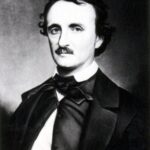William Wordsworth is regarded as one of the founders of Romantic poetry, and was a major influence in the movement known as Romanticism. His poems were written for common people, about common people, and normally relating to nature. Two of his most famous poems, “Michael: A Pastoral Poem,” which was the final poem in the Lyrical Ballads collection between Wordsworth and Coleridge, and “Lines Composed a Few Miles above Tintern Abbey.” Both poems are works of art, and encrypt substantial meanings and common themes. They each explore how man’s moral nature develops, man’s attachment to nature, and the tradition of passing on possessions, memories, and scruples.
In the Romantic Age, it became evident that people’s morals were becoming corrupt, and Wordsworth attempted to teach his readers the secret to moral development through his poems. Both “Michael” and “Tintern Abbey” attempt to convey the message that “If man is morally best when most natural, uncorrupted by false custom and education, then the normal process of growing up in the modern world must be kind of falling away from its natural grace” (Magill, 3132). The story of “Michael” is about a Shepard, a profession which immediately connects to the common people. Michael loves his land and his profession, thereby loving nature. He has worked relentlessly throughout his lifetime, and because of his attachment to nature he is uncorrupted by society and his morals remain intact.
In “Tintern Abbey,” the speaker has had his morals altered by society, but his love of nature saves him. The poem begins with the speaker having “Gleams of half-extinguished thought…dim and faint” (‘Tintern Abbey”, 58) and ends with his claim to being a “worshipper of Nature,” (“Tintern Abbey”,152) to whom he owes his saving. Morals determine who a person is, and how they act. Almost all the characters in each poem has to deal with their own morals, or the corruption of morals around them. Society and power can easily corrupt a man with good morals, and this development is what Wordsworth is trying to point out. Luke, in “Michael,” is the perfect representation of how morals can be so easily corrupted. He was brought up by a man with pure morals, and a love for nature, yet as soon as he enters the city seeking fortune, he “gave himself / To evil courses,” (“Michael”, 446-447) and fell to shame and ruin.
Carl Wooding wrote that in “Michael,” “the poem thus pits the ‘dissolute city’ against the everlasting hills” (Wooding, 69). The morals gained, and lost, from different lifestyles and upbringings decide who the person is. Moral development is an important part of a person’s life, and Nature is the key to proper morals. The speaker in “Tintern Abbey” returns to Tintern Abbey with his young sister to once again revive his love of Nature, and see the innocence of childhood. A child, in their innocence, has not yet been corrupted by society, and the speaker is able to use memories of these times to retain his morals.
Michael is an old Shepard, who has worked relentlessly his entire life, and loves his land and his wife, Isabel. The extreme love and attachment to Nature can be easily seen by Michael, and by the speaker in “Tintern Abbey.” Both characters use nature to retain their moral values, as well as an escape from the corruption of society and city life. In the Romantic Age, people began to believe that through Nature, a person could be closer to their God. Wordsworth was a strong believer in this theory, as he shows in “Michael” and “Tintern Abbey.” Critic David Kelly believes “Nature is nature, and exists independently, but the idea of nature can processed into something greater, even into the idea of God’s existence” is the theme of “Tintern Abbey” (Kelley, 1). In “Michael,” the Shepard, a common man who is very close to nature, is the most moralistic and almost saintly of men. Without nature man could not survive, yet without man nature’s true beauty would not be exposed.
Two places in “Michael” represent the extremes of good and evil. The mountains symbolize Nature, and everything that is good and moral. The city represents society, and the corruption of morals and goodness. Michael, the old kindly Shepard, has not been corrupted by the city life because he has chosen to live his life in Nature. “He has lived all his life in the mountains, in communion with Nature, and his own nature has been shaped by his natural environment. He is a good and kindly man” (Magill, 3131). The city is an urban area, with a lack of nature, and therefore a lack of morals. Luke is so easily and quickly corrupted there to pursue evil, that he must run away to escape after a short while. Luke was brought up by Michael, and taught to be kind and ethical, yet society is still able to corrupt the boy, and because he is not able to escape back to Nature, he fails his father.
Tradition is an important part of mostly everyone’s life, in one way or another. The idea of continuing something that was started or discovered long ago is appealing to people because they want to pass on that which they love to people they love. In “Michael,” Michael is compelled to teach his son Luke the life of a Shepard, in hopes of having him take over the lifestyle someday, as he had from his father. In “Tintern Abbey,” the speaker also desires to give his memories to his sister, in hopes that she will use them to benefit her as he did himself. The teller of the story of “Michael,” who speaks briefly before the tale begins, offers the story “for the sake / Of youthful Poets, who among these Hills / Will be my second Self when I am gone,” expressing the yearning that others may learn from the story, and continue his tradition (“Michael”, 37-39). “By implanting through the language of the poem memories of his own past perceptions and associations, he hopes to perpetuate himself beyond his own physical death- precisely what the speaker attempts through his sister in ‘Tintern Abbey'” (McDayter, 198).
As Luke is preparing to leave for the city, his father pulls him aside to speak to him. He says “Luke, I pray that thou / May’st bear in mind the life they Fathers lived” (“Michael”, 409-410). As Edward Duffy comments, “In this explicitly named covenant between generations, the father prays that, no matter how far Luke may range, he will still center himself on this moment, will still return in spirit to the cornerstone of his life.” A tradition is a specific memory or way of life that is passed on from generation to generation, shown directly when Michael gives his son Luke a Shepard staff, and teaches him how to take care of the sheep. This custom had been continuing for many years in Michael’s family, and in those same mountains, on that same land. He wanted nothing more than to continue his family’s lifestyle for many more years, and his failure to do this crushes him.
Although it is not evident in the beginning of the poem, where the speaker is fighting with his own memories and emotions, by the end of “Tintern Abbey” it is clear that he wants nothing more than to pass on his memories and joy of the abbey to his sister. “She is a permanent and legible record of what he one was,” and she “in effect becomes the anchor, nurse, guide, guardian- and surrogate for an unbetraying Nature” (Kirkpatrick, 2). Through her the poet is able to see his past self, and remember his closeness to Nature. In order to protect her, he tells his sister to “let the misty mountain winds be free / To blow against thee: and, in after years, / When these wild ecstasies shall be matured / Into a sober pleasure; when they mind / Shall be a mansion for all lovely forms, / They memory be as a dwelling place / For all sweet sounds and harmonies,” a lesson that he has learned, and wants her to know and understand (‘Tintern Abbey”, 136-142).
The Romantic Age was a time when people started realizing that the world was changing. Bruccoli Clark writes that “because of political and economic pressures, Wordsworth saw- and lamented- that that the shepherd’s simple way of life was dying out. However, the narrator redeems Michael’s loss by telling his story, thereby preserving the values of his culture and transmitting those values ‘to a few natural hearts.'” Wordsworth tells “Tintern Abbey” for the very same reason, to show the dying out of morals and simple ways of life. He hopes that by returning to Nature, and by making people realize what is happening, there is still hope.
Although different styles of poetry, Wordsworth’s “Michael” and “Tintern Abbey” both express the same themes and messages. A human’s morals determine who they are, and the people that they love and learn from must establish right from wrong. Nature, solitude, and hard work are the secrets to being close to your God, and moral development. The city and society can easily corrupt a person, no matter how strong they believe they are, so it is important to stay close to Nature, and return to it in times of need. Wordsworth wants his readers to reflect upon their lives and their memories and pass on important knowledge for future generations.


